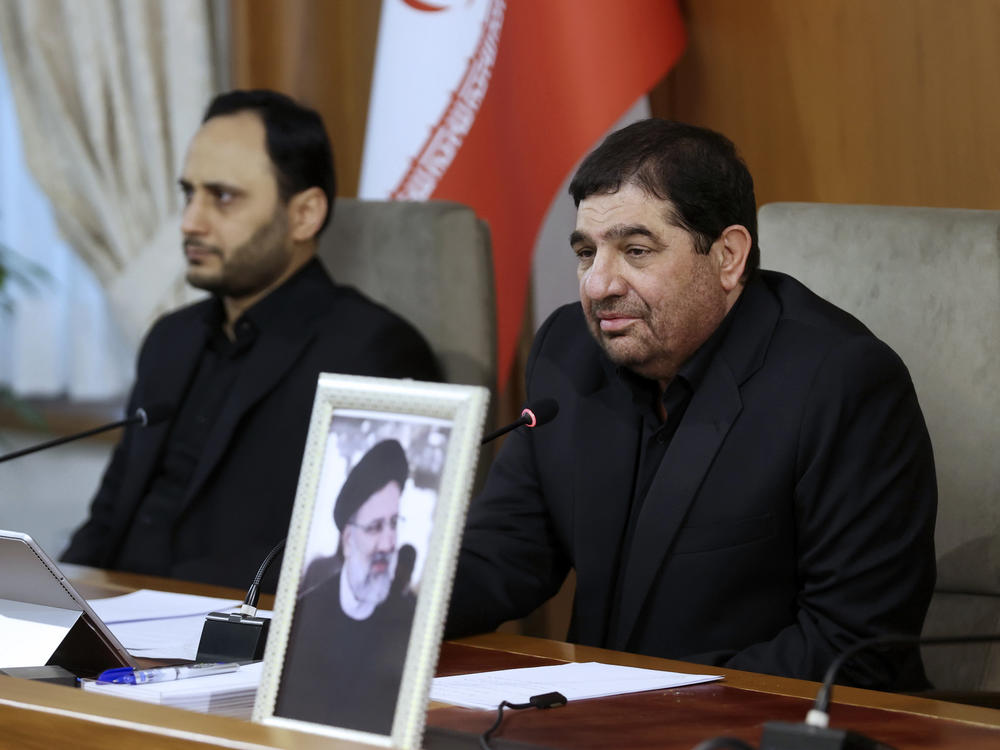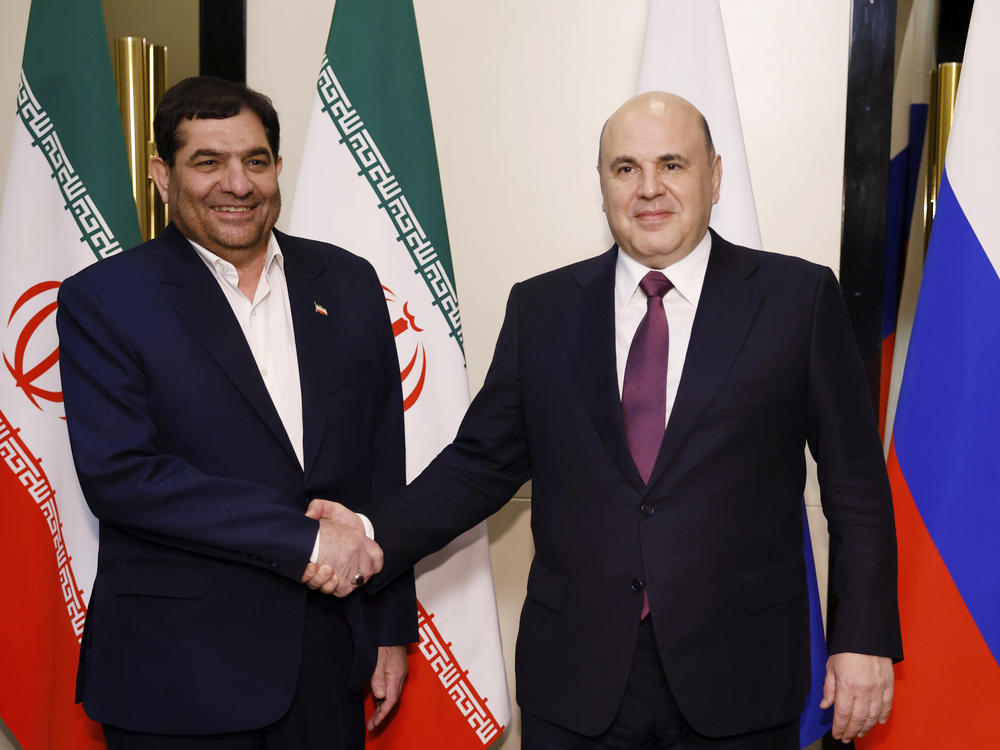Section Branding
Header Content
What to know about Mohammad Mokhber, who is stepping in as interim president of Iran
Primary Content
Iranian President Ebrahim Raisi, Foreign Minister Hossein Amirabdollahian and several other government officials were killed in a helicopter crash on Sunday, leaving the country in leadership limbo at a time of especially high regional tensions.
After their deaths were confirmed by state media on Monday, Iran's supreme leader, Ali Khamenei — who is the highest-ranking political and religious leader in the republic — announced five days of mourning and a new interim president: Mohammad Mokhber.
The president is Iran's second-ranking — but top-elected — official. Mokhber is expected to hold that role temporarily since Iran's constitution requires that a new election must be held within 50 days of the death of a sitting president.
Robin Wright, a joint fellow at the U.S. Institute of Peace and the Wilson Center, says Raisi's death may not shake up the day-to-day running of the country, but rather its longer-term future, as the hardliner was widely considered a potential successor to 85-year-old Khamenei.
"There will be a process that's in place, they will find a new president, but the scramble behind the scenes will be very, very interesting," she told Morning Edition.
Mokhber, 68, is part of the three-person council charged with organizing that election.
At a Monday meeting, he urged top Iranian officials to continue their work without disruption, the Washington Post reported.
"The framework and foundations of the system are strong, and there will not be the slightest problem in the administration of the country under the permanent shadow of the leadership," Mokhber said.
He most recently served as first vice president of Iran, the most senior of a dozen such positions. He's kept a relatively low profile despite holding a series of prominent roles in Iran's government and charitable foundations, including those with ties to Khamenei, and has been sanctioned by both the U.S. and European Union.
Here's what else to know about him.
His tenure as top deputy included a wartime visit to Moscow
Mokhber, who holds a Ph.D. in international law, was appointed first vice president when Raisi was elected in 2021.
According to the revised Iranian constitution of 1989, the president's first deputy can be tasked with "the responsibilities of administering the affairs of the Council of Ministers and coordination of functions of other deputies," with the president's approval.
The first vice president will also assume — with the approval of the supreme leader — the "powers and functions" of the president in the case of their death, dismissal or absence.
"The Council, consisting of the Speaker of the Islamic Consultative Assembly, head of the judicial power, and the first deputy of the President, is obliged to arrange for a new President to be elected within a maximum period of fifty days," reads Article 131.
In his role as first vice president, Mokhber traveled within Iran to shore up political support, including visiting the site of a 2022 building collapse that killed dozens and fueled accusations of corruption against those involved in the permitting process. He also had a hand in international diplomacy, receiving visiting leaders from places like Syria and China.
Vice presidents tend to hold a relatively low profile in Iran, though Mokhber did generate some headlines during his tenure.
He was part of a team of Iranian security officials who visited Moscow in October 2022, months into Russia's war with Ukraine, to discuss weapons deliveries. Reuters reported that the group agreed to provide more surface-to-surface missiles and drones to Russia's military.
The Washington Post reported that during that visit, Mokhber blamed NATO for the killing of Ukrainians and proposed an Iranian-Russian working group to undermine Western sanctions.
"We have been under these sanctions for 40 years and did not allow them to undermine the government of the country or to seriously affect us," he said of Iran, suggesting they had much to teach Moscow.
Mokhber was a key player in a network of charities with ties to the state
Mokhber's official biography touts his "experience in numerous management positions," including with several foundations and the production of Iran's first COVID-19 vaccine.
Mokhber has played a key role in several charitable trusts tied to the Iranian state, known as bonyads.
The U.S. Treasury Department has described them as "opaque, quasi-official organizations generally controlled by current and former government officials and clerics that report directly to the Supreme Leader." It says a lack of accountability has "allowed systemic corruption and mismanagement to grow unchecked," accumulating wealth without benefiting the Iranian people as promised.
United Against Nuclear Iran, a U.S.-based nonprofit advocacy organization, says Mokhber spent a large part of his career working at "important Bonyads implicated in Iran's ballistic missile and nuclear programs, terrorism, corruption, mismanagement, human rights violations, and sanctions evasion."
Mokhber was most recently the head of Setad, an investment fund linked to Khamenei. Its full name is Setad Ejraiye Farmane Hazrate Emam, also known as the Execution of Imam Khomeini's Order (EIKO). It was established by Khamenei's predecessor and derives many of its assets from property seized from Iranian citizens, according to Reuters.
Mokhber joined Setad as its chief executive in 2007. The U.S. imposed sanctions on the organization in 2013, calling it a "massive network of front companies hiding assets on behalf of the Government of Iran's leadership."
Years later, during the height of the pandemic, Mokhber oversaw Setad's effort to make a COVID-19 vaccine, through one of its foundations. The Associated Press says "only a fraction" of its promised tens of millions of doses "ever made it to the public, without explanation."
The U.S. sanctioned Setad — which it calls EIKO — again, along with Mokhber personally, in 2021.
"EIKO has systematically violated the rights of dissidents by confiscating land and property from opponents of the regime, including political opponents, religious minorities, and exiled Iranians, while, according to its leader Mohammad Mokhber, being tasked by the Supreme Leader to implement a resistance economy," the Treasury Department said at the time, describing an economy that tries to circumvent sanctions.
Mokhber was also among a group of seven Iranians that the European Union sanctioned in 2010 for involvement in "nuclear or ballistic missiles activities." He was removed from the list two years later.
Mokhber has also held senior roles in Sina Bank and the Mostazafan Foundation, both of which have been subject to U.S. sanctions.
The Treasury Department has said Khameini uses the Mostazafan Foundation — a conglomerate of holdings in key sectors including finance, energy and mining — to "reward his allies under the pretense of charity."
During Mokhber's tenure at Mostazafan, he ended up embroiled in a legal battle between two mobile phone service providers — Turkcell and MTN — looking to enter the Iranian market, the AP reports. Turkcell ultimately alleged in legal filings that Mokhber used "improper influence up to and including negotiating with and on behalf of the Supreme Leader in MTN's favor."
Mokhber also joined Iran's Expediency Council in 2022. The group advises the supreme leader and settles disputes over legislation between Iran's parliament and the Guardian Council, which consists of six experts in Islamic law and six experts in constitutional law.
"If his past is any indication of his future, his current role in the elected branch of government will be used to perpetuate corruption, implement a resistance economy, and punish regime enemies," says United Against Nuclear Iran.


